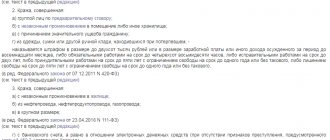If you become a victim of a theft charge, it is strongly recommended to remain calm and study the norms of domestic legislation, which will subsequently help you justify yourself and avoid punishment.
In this article we will tell you what types of theft exist and what legislative acts regulate them, what rights a person accused of theft has, who and how establishes the crime, what actions should be taken by a person who has been charged with theft.
Multi-channel free hotline Legal advice on criminal law. Every day from 9.00 to 21.00
Moscow and region: +7 (495) 662-44-36
St. Petersburg: +7 (812) 449-43-40
The legislative framework
Cases of false accusations of theft are found at every turn today: in a supermarket, in a cafe, at work, by a boss who wants to hide unplanned expenses by accusing one of his subordinates of theft.
In addition, accusations of theft can come from the most unexpected sources - from acquaintances, colleagues or even friends. Being confident of someone’s guilt, the citizen will send a complaint to the police, and after the fact of the complaint, an inspection will be carried out and, if the facts stated in it are confirmed, a charge of theft will be brought under Article 158 of the Criminal Code of the Russian Federation.
But if, during the verification of the theft application, it turns out that the accusation is fabricated, the applicant himself will be held accountable, but under Article 128.1 of the Criminal Code of the Russian Federation “On libel.”
It should be borne in mind that it is possible to falsify a theft charge in almost any situation. Example: a student saw a phone on a bench, who had forgotten one from the university stream, and took it so that no one would steal it and in order to ask fellow students who it belonged to. Subsequently, this action may be classified as theft.
If you are accused of theft without evidence
In ordinary life, even the accidental loss of money or property can raise suspicions of theft. However, this does not mean that the suspicions are true, because in order to bring criminal charges, reliable evidence is needed. The most common situations in which an unproven accusation of theft is possible include:
- the fact that a citizen was present in the store at the time of discovery of missing goods;
- identifying the fact of secret theft of a wallet from a pocket on public transport when other people are standing nearby;
- loss of corporate property or monetary assets to which a limited number of employees had access;
- loss of money, for which only the cashier was responsible while servicing the queue of customers;
- other cases of missing things or money, when all the circumstances point to the guilt of certain persons.
Even the most serious and convincing suspicions of theft always need evidence. Therefore, the easiest way to defend against charges of theft is to invite the victim to confirm his arguments. As a rule, even with an objective analysis of the situation between citizens, any reason for doubt can be eliminated, which will help find the true culprit. The following circumstances may be grounds for an allegation of theft:
- the person has stolen things, objects or a wallet with money;
- detection of stolen items in a citizen’s residential premises, his car or other similar places;
- detection of theft in transport when the circle of suspects is limited;
- data from video cameras that captured a certain citizen at the scene of the theft.
Note! Proving the facts of theft can only be carried out within the framework of a criminal case. To do this, the victim must write a statement to the police and state all the circumstances of the crime.
A statement about the fact of theft will not be considered as a false denunciation if it does not indicate a specific person as the criminal. In this case, the applicant can indicate a list of citizens who may be involved in the theft. The final conclusions on all issues will be made by the investigation and the court.
Rights of the accused
In accordance with Article 51 of the Constitution of the Russian Federation, any citizen of the Russian Federation has the right not to testify against himself or his loved ones, therefore, having received an accusation of theft, the falsity of which you have no doubt, you can safely remain silent until you contact a lawyer (or do not receive guaranteed free legal assistance).
You should also remember the presumption of innocence, according to which the accused person remains innocent until his guilt is proven 100%.
It does not matter who the accusation comes from - an individual or a legal entity. Until they provide sufficient evidence to prove your guilt, you will be considered innocent and will not be subject to arrest or other preventive measures.
A person who is unable to pay for the services of a private lawyer has the right to count on receiving free legal assistance from the state.
Every citizen who is confident that his legal rights and interests have been infringed has the right to protect himself by contacting one of the law enforcement or supervisory authorities on the basis of Article 128.1 of the Criminal Code of the Russian Federation or Article 152 of the Civil Code of the Russian Federation.
Punishment for unfounded accusation of theft or embezzlement
If the victim contacts the police, but there is no evidence of theft and no basis for charges, a refusal to open a criminal case will follow.
Depending on whether the accusation was knowingly false or erroneous, the victim or other person may be held liable:
- According to criminal law, for the dissemination of knowingly false information discrediting the accused (Criminal Code of the Russian Federation, Article 129.1), punishment is provided in the form of a fine from 500 thousand rubles to 5 million rubles. or compulsory work for a period of 160 to 480 hours.
- According to criminal law, knowingly false denunciation of a crime (Article 306 of the Criminal Code of the Russian Federation) is punishable more harshly and in some situations provides for imprisonment for up to 2 years.
- According to civil law, protection of honor, dignity or business reputation is the right according to the law of every citizen of the Russian Federation (Civil Code of the Russian Federation, Art. 152). You can demand a refutation, as well as damages (for example, costs of hiring a lawyer) and compensation for moral damages.
Corpus delicti
In accordance with current legislation, the right to establish and confirm the corpus delicti is vested exclusively in law enforcement officials (police, prosecutor's office).
So, upon receiving a complaint about theft, police officers organize an investigative check in order to study the information provided in the statement. If the police refuse to carry out this event, the applicant has the right to apply again to a higher authority - the prosecutor's office.
Despite the fact that the jurisdiction of this supervisory authority does not include the consideration of civil petitions, its employees have the right to force law enforcement officers to focus on a specific civil petition.
As for applying to the judicial authorities with a claim for theft, it is advisable to do this only if the applicant has sufficient evidence of the commission of this crime.
How is theft different from robbery?
What is the difference between theft and robbery? Russians often confuse these concepts, but if you understand this issue a little, their dissimilarity will be obvious.
Without going into too much detail, there are two main differences:
- If theft is a secret act, then during robbery someone else's property is stolen openly ;
- Unlike theft, robbery can entail not only material, but also physical damage - for example, beating or committing other violent acts (tying hands, handcuffing, leaving someone in a locked room, etc.).
Note! Criminal liability for robbery is provided for in Art. 161 of the Criminal Code of the Russian Federation.
Object, subject
The objective side of theft is represented by property relations of a certain form. The subjective side is other people's property and money.
At the same time, the object is the secret theft of property to which the attacker has no rights. The status of “secret” theft will be received in the following cases:
- If the theft of property occurred in the presence of its owner, but he did not notice it;
- If the theft process was recorded by several eyewitnesses, they did not realize what it was;
- If the theft of property occurred while its owner was absent;
- If the theft was witnessed by incapacitated persons who are unable to objectively perceive reality, i.e. have mental disorders, for example, suffer from schizophrenia, bipolar disorder, etc.;
- If the criminal act was witnessed by citizens who were aware of what was happening, but did nothing to prevent it.
The subjective side of this crime is direct intent, the motive is prudence.
Subject – a person over 14 years of age who has not lost legal capacity.
What is theft from a legal point of view?
So, first of all, you need to understand the terminology. The most precise definition of the concept of “theft” can be found in Art. 158 of the Criminal Code of the Russian Federation. This article states that theft is the secret theft of someone else's property. It is worth noting that the subject of such theft can only be material property that has consumer value. For example:
- Money;
- Material assets (vehicles, household appliances, gadgets, jewelry, etc.);
- Documents equivalent to money or material assets (lottery tickets, checks, bills, bonds, etc.).
At the same time, the subject of theft cannot be:
- Nuclear materials and radioactive substances (their theft is provided for in Article 221 of the Criminal Code of the Russian Federation);
- Weapons and ammunition (Article 226 of the Criminal Code of the Russian Federation);
- Narcotic and psychotropic drugs (Article 229 of the Criminal Code of the Russian Federation).
Actions of the accused party
Below we will present the most common situations - shoplifting and theft charges based on the fact of filing a statement.
In the shop
Approximate situation: you went to the grocery store, bought ingredients for dinner, paid at the checkout and headed towards the exit. Suddenly a security guard stops you and demands to show you the contents of the package. It should be borne in mind that from the point of view of the law, such requests are considered illegal, and therefore it is not worth responding to them with unquestioning obedience. First of all, you should ask what caused such an interrogation. If the security guard voices a sufficiently compelling reason, you need to inquire when law enforcement officers (police) will arrive at the inspection site, since, according to the law, only they have the right to conduct this event.
In addition, two witnesses must be invited to the inspection site, in whose presence, after examining the contents of the package, a corresponding report will be drawn up. It will reflect the results of the inspection.
If the inspection procedure is carried out with violations, the citizen against whom it was carried out has the right to seek material compensation for moral damage caused. To do this, you will need to draw up a statement of claim in the established form, and then submit it to the court in one of the possible ways.
Through statements
If you have been accused of theft, the first thing you should do is encourage the person accused to report it to the police by filing a police report. As a rule, in practice this rarely comes to this, since the accusing person does not want to incur liability for perjury, which is a criminal offense.
Example: a person nevertheless turned to the police to accuse you of committing a crime such as theft, testifying to this, and drawing up a corresponding statement. In turn, you can contact the police with a statement of slander, refuting the accusation.
Based on complaints received from citizens, investigative measures will be initiated, the results of which will be ready in 3-10 days.
If you are to blame
If you were caught red-handed, then the most correct thing in this situation would be a sincere admission of what you did, as well as an expression of the initiative to compensate for the damage caused to the person or organization that you robbed.
You can also attempt reconciliation with the injured party, but the likelihood that she will agree to a meeting is minimal.
At the very beginning, the most important thing is to answer the question for yourself: are you guilty or not?
In order not to delve into the jungle of analysis of Art. 158 of the Criminal Code of the Russian Federation or Art. 7.27 of the Code of Administrative Offenses (which talks about petty theft - the same theft, but when the value of the stolen property is less than 2,500 rubles), we can say the following: theft is a situation when someone else’s property was taken secretly and appropriated for oneself, and the owner was not given any in return compensation (monetary or other material). Therefore, a person who is accused of theft must understand for himself whether he really stole something or whether the accusations are false.
A person accused of theft has two options.:
- If he really committed the theft , it is better for him to admit his guilt, return the stolen property or compensate for the damage in another way. In many cases, this may be the end of the incident, and the situation will not lead to the initiation of a criminal case.
- If there was no theft , you should defend your rights both independently and by inviting a lawyer.
Next, you need to determine whether there is concrete evidence
One of the basic principles of justice in criminal cases is the presumption of innocence. It means that everyone is presumed innocent until proven otherwise. Therefore, in order to bring charges, it is necessary to have evidence.
The main task of a person accused of theft is to find out on what basis the accusation was brought and what the investigation and the victim have against him. If the evidence is significant, you should look for an opportunity to resolve the case without trial by compensating the damage; if not, you should stand your ground.
And try to resolve the issue before the trial
If the accusations are not completely groundless, it is better to admit guilt and resolve the matter peacefully. To do this you need:
- Apologize.
- Fully compensate for the damage caused.
In this case, with the consent of the prosecutor or head of the investigation, the investigator or inquiry officer will have the right to terminate the criminal case in accordance with Art. 25 Code of Criminal Procedure of the Russian Federation.
Article 25 of the Code of Criminal Procedure of the Russian Federation. Termination of a criminal case due to reconciliation of the parties
The court, as well as the investigator with the consent of the head of the investigative body or the investigator with the consent of the prosecutor, have the right, on the basis of a statement from the victim or his legal representative, to terminate a criminal case against a person suspected or accused of committing a crime of minor or medium gravity, in cases provided for in Article 76 of the Criminal Code Russian Federation, if this person has reconciled with the victim and made amends for the harm caused to him.
Help from a lawyer
Finally, if a criminal case is nevertheless initiated, you should seek the help of a lawyer. The sooner this is done, the better: it is easier to get the case dismissed at the pre-trial stage than to get an acquittal in court. You can hire a lawyer yourself . If there is no money for his services, help can be obtained at the expense of the state from an appointed lawyer. However, as a rule, in this case the quality of services will be much lower.
Responsibility
If the accusation of theft is confirmed to be false, the person who initiated it will face an administrative fine or compulsory labor (Article 218.1 of the Criminal Code of the Russian Federation).
Giving false testimony is punishable under Article 307 of the Criminal Code of the Russian Federation, according to which the guilty person faces an administrative fine, compulsory or correctional labor, temporary imprisonment or imprisonment.
If the theft is confirmed, the nature and scale of punitive measures will depend on the amount of damage caused. If it is less than 5 thousand rubles, then the guilty party will be held accountable under Article 7.27 of the Code of Administrative Offenses of the Russian Federation, if more than 5 thousand rubles - under Article 158 of the Criminal Code of the Russian Federation.
Moral compensation for an unfounded accusation of theft
Depending on whether a person’s false accusation of theft was intentional or not, not only the amount of moral compensation depends, but also the legal liability of the accuser: criminal or civil. In order to obtain financial compensation for the moral suffering suffered by a person as a result of his accusation of embezzlement or theft, it is necessary to go to court. First, you will need to thoroughly prepare, collect the necessary evidence of the illegal accusation of theft and substantiate the amount of claimed moral damage (Civil Code of the Russian Federation, Art. 55).
When going to court, the plaintiff independently determines the amount of the claim, but it is important to remember that when making a decision, the judge is guided by the principles of legality, fairness and proportionality.
Russian judicial practice shows that most often the judge assigns an amount to be paid that is 20-50% less than what was declared by the plaintiff, so you can safely indicate an amount greater than what is actually required.
What else can you do
The actions presented are of a primary nature, however, this is not all that can be done in such a situation. Also recommended:
- clarify how the item that was allegedly stolen from the victim was valued. Criminal liability begins from the amount of 2,500 rubles. If it was assessed from the words of the victim, you can try to challenge such an assessment by involving an expert;
- try to talk to the victim and present him with your version of events. However, if he is aggressive, then it is better to skip this point;
- analyze practice. It is best to do this together with a lawyer. Each case is unique, but you can try to understand the general logic of judges when making such decisions.
At any stage, you must try to act as calmly and deliberately as possible. Emotions will not help matters, but will only make the situation worse.
If no action helps, and the police refuse to accept evidence, violate the rights of the accused, threaten, insult, or force anyone to take any action, it is recommended to contact the prosecutor’s office to protect your rights. It is best to do this in writing, which will ensure maximum analysis of the appeal.
Remember that the basis of criminal proceedings in Russia is the presumption of innocence. This means that it is not the accused who has to prove his innocence, but the state who has to prove the guilt of the person. However, this does not mean that you can relax and not prove that you are right.
You need to choose the right tactics for the trial and use certain methods, facts and documents at the right time.
Where to find evidence of innocence
Various factors, documents and confirmed information can be used as evidence to justify a certain position. In the case where a person is accused of theft, it is recommended to pay attention to the following points:
- try to find witnesses who will confirm that the accused was in a different place on the day and time the crime was committed. It is advisable that these are not close relatives; ideally, there are several witnesses;
- if there is another way to prove location in another place, it should be used. For example, the accused could be in a shopping center that is under video surveillance. It’s worth talking to the administration and clarifying this point.
It is recommended not only to collect your own evidence, but also to analyze the evidence referred to by the victim and the police. For example, if there is a recording from a camera, then you should think about involving an expert who will indicate its authenticity or can confirm that there is another person on the recording.









